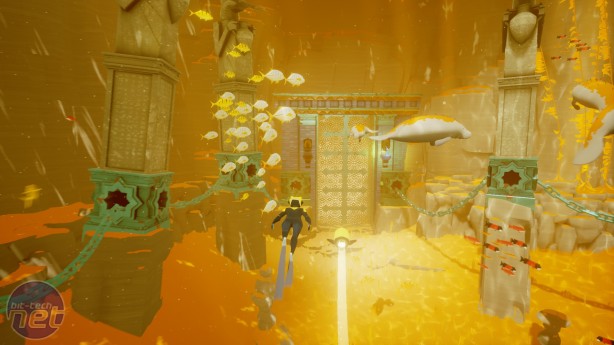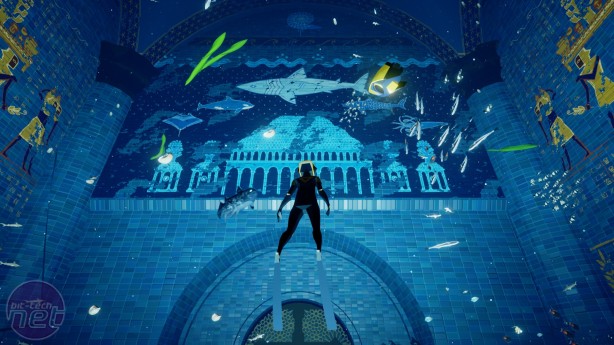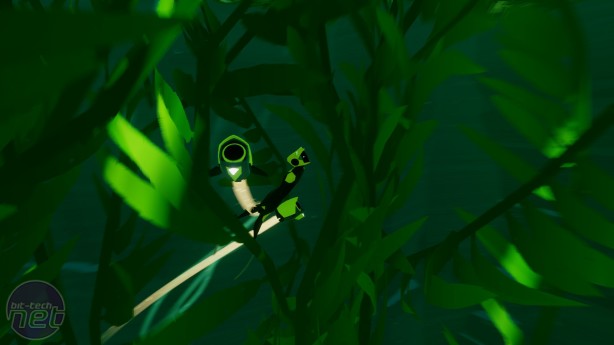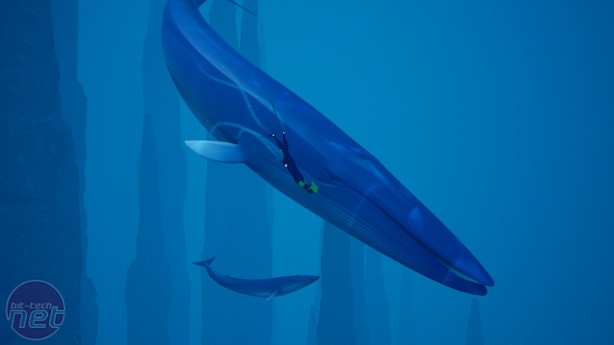
As I already hinted at, Abzû is mechanically a very simple game. There’s a smattering of basic puzzles, and one or two mini-game-like sequences in which you 'collect' shoals of fish while travelling along a powerful current, but the vast majority of the game involves simply enjoying the sights and sounds which Giant Squid has crafted. This isn’t to say there’s nothing to do, it’s just the game never tries to ensnare you in a feedback-loop with skinner-box like rewards. Instead, the pleasure of playing Abzû stems from the flow of movement and how it encourages you to mess around with its wonderful wildlife.
Abzû is a linear game, but one that isn’t so much scripted as choreographed. Much of the time Abzû resembles an underwater ballet. The story is told wordlessly, relying on movement and music and rhythm to convey its themes and plot-beats. The game’s excellent orchestral score flows parallel to the momentum of the game, swelling during more action-focussed sequences, then fading back as the environments open up for exploration, quietly heightening the blissful peacefulness of Abzû’s virtual ocean.
It’s in these more subdued moments when Abzû lets you play with all those wonderful subaquatic animals, hitching a ride on a passing Manatee, or leaping out of the water in graceful arcs with a pod of dolphins. Explore the world more fastidiously, and you might find small circles of coral which, when interacted with, introduce a new animal species to the environment, or you could stumble upon a hidden area. There’s no systemic reason behind any of this, but I found myself doing these things anyway simply because of how enjoyable it is to spend time in this virtual place.
I’m not blind to the simplicity of Abzû , and I’m sure it’s lack of more tangible rewards and lightness of interaction will earn it a fair share of criticism, but for me the way Abzû decouples itself from the reward-system of most games works superbly. That said, I do have other issues with the game. Primarily, the camera can be rather fussy to control. It’s possible to look around freely with the mouse or right-trigger (the game strongly urges you to use a gamepad). But if you move while looking around the camera has a tendency to get stuck, which means you often end up having to wrestle it away from an unhelpful angle. In addition, there are points where the game takes control of the camera for you, but it doesn’t always make this transition clear. The inability to change or even examine the control scheme in the options menu is also disappointing.
Away from technical hitches, I think the story is a little too sparse for its own good. I love picking apart an ambiguous narrative in a game, but there’s a big difference between ambiguous and absent. Abzû isn’t quite narratively austere enough to fall into the latter category, but the smattering of cryptic hieroglyphics you encounter on your travels simply aren’t enough of a foundation to build an interpretation atop of. I accept and enjoy the balletic qualities of the game, but its gestures need to be more definite and less, well, watery. Instead, we only get a vague sense of the game’s themes (such as nature versus technology), and that ends up being frustrating rather than enticing.
Nevertheless, I’d recommend taking a dive into Abzû. It’s a short game, somewhere between ninety minutes and three hours depending on how thoroughly you explore its environments. But like another of my favourite short games, the delightful Grow Home, it crams more fun into that brief running time than most games do into a day’s worth of play. With a less stubborn camera and more clarity in the story, Abzû might have surfaced from this review with an Outstanding award. As things stand, it only delves deep enough to be -
Abzû is a linear game, but one that isn’t so much scripted as choreographed. Much of the time Abzû resembles an underwater ballet. The story is told wordlessly, relying on movement and music and rhythm to convey its themes and plot-beats. The game’s excellent orchestral score flows parallel to the momentum of the game, swelling during more action-focussed sequences, then fading back as the environments open up for exploration, quietly heightening the blissful peacefulness of Abzû’s virtual ocean.
It’s in these more subdued moments when Abzû lets you play with all those wonderful subaquatic animals, hitching a ride on a passing Manatee, or leaping out of the water in graceful arcs with a pod of dolphins. Explore the world more fastidiously, and you might find small circles of coral which, when interacted with, introduce a new animal species to the environment, or you could stumble upon a hidden area. There’s no systemic reason behind any of this, but I found myself doing these things anyway simply because of how enjoyable it is to spend time in this virtual place.
I’m not blind to the simplicity of Abzû , and I’m sure it’s lack of more tangible rewards and lightness of interaction will earn it a fair share of criticism, but for me the way Abzû decouples itself from the reward-system of most games works superbly. That said, I do have other issues with the game. Primarily, the camera can be rather fussy to control. It’s possible to look around freely with the mouse or right-trigger (the game strongly urges you to use a gamepad). But if you move while looking around the camera has a tendency to get stuck, which means you often end up having to wrestle it away from an unhelpful angle. In addition, there are points where the game takes control of the camera for you, but it doesn’t always make this transition clear. The inability to change or even examine the control scheme in the options menu is also disappointing.
Away from technical hitches, I think the story is a little too sparse for its own good. I love picking apart an ambiguous narrative in a game, but there’s a big difference between ambiguous and absent. Abzû isn’t quite narratively austere enough to fall into the latter category, but the smattering of cryptic hieroglyphics you encounter on your travels simply aren’t enough of a foundation to build an interpretation atop of. I accept and enjoy the balletic qualities of the game, but its gestures need to be more definite and less, well, watery. Instead, we only get a vague sense of the game’s themes (such as nature versus technology), and that ends up being frustrating rather than enticing.
Nevertheless, I’d recommend taking a dive into Abzû. It’s a short game, somewhere between ninety minutes and three hours depending on how thoroughly you explore its environments. But like another of my favourite short games, the delightful Grow Home, it crams more fun into that brief running time than most games do into a day’s worth of play. With a less stubborn camera and more clarity in the story, Abzû might have surfaced from this review with an Outstanding award. As things stand, it only delves deep enough to be -


MSI MPG Velox 100R Chassis Review
October 14 2021 | 15:04













Want to comment? Please log in.